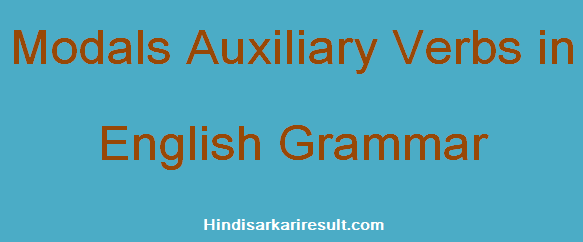Modals / Types of Models / Use of Modals in English Grammar
Modals को Modals Auxiliary Verbs भी कहा जाता है. इस पोस्ट में हम आपको ये बताएँगे कि इनका प्रयोग English Grammar में कैसे होता है.
Use of Modals
English Grammar में Modals के बिना हम किसी भी हिंदी वाक्य को English में translate नहीं कर सकते है। English Grammar में Tense सीखना जितना महत्वपूर्ण है उससे कहीं ज्यादा Modals का Use सीखना महत्वपूर्ण है।
English Grammar में Verb दो प्रकार की होती है –
- Lexical Verbs
- Auxiliary Verbs
Lexical Verbs : वे verbs जो Sentence में Main verbs के रूप में प्रयुक्त होते है जिसका verb की फर्स्ट form, सेकंड form, थर्ड form, फोर्थ form (ing-form) और फिफ्थ form (s/es form) के रूप में प्रयोग होता है तथा जिसका अर्थ स्वतंत्र होता है, Lexical verb कहलाते है।
Auxiliary Verb : वे verbs जो अन्य verb के साथ प्रयुक्त होकर Question, Negative तथा Tense बनाने के साथ-साथ possibility तथा willingness को express करने का कार्य करते है, Auxiliary Verb कहलाते है। इन्हें helping verb भी कहा जाता है। ये तीन प्रकार की होती है –
- Primary Auxiliary Verbs: do, does, be, is, am, are, has, have, been, did, was, were, had, shall, will etc..
- Modal Auxiliary Verbs: can, could, may, might, shall, should, will, would, must, ought to.
- Marginal Auxiliary Verbs: used to, need, dare.
इस पोस्ट में हम Modal Auxiliary Verbs जिसे Modals भी कहा जाता है, उसके बारे में पढेंगे.
Rules about the Use of Modals in Hindi
Rule (1)-
Modal Auxiliary verbs का प्रयोग Main verbs के रूप में नहीं होता है। इसका प्रयोग Helping verb के रूप में होता है।
जैसे –
You can help me. (‘can’ – helping verb और ‘help’ – main verb)
It may rain today. (‘may – helping verb और ‘rain’ – main verb)
Rule (2)-
Modal Auxiliary verbs की फर्स्ट form, सेकंड form, थर्ड form, फोर्थ form (ing-form) और फिफ्थ form (s/es form) नहीं होते है। इसका प्रयोग सभी numbers तथा person के Subject के साथ हमेशा एक ही रूप में होता है। अर्थात् इसके रूप में कोई परिवर्तन नहीं होता है।
जैसे –
I can speak English.
You can speak English.
They can speak English.
Rule (3)-
सामान्यतः Modal Auxiliary verbs के बाद first form of Main Verb का प्रयोग होता है। अर्थात् Infinitive with ‘to’ का प्रयोग नहीं होता है।
जैसे –
He will come here.
He will to come here.
Rule (4)-
Ought तथा Used के बाद Infinitive with ‘to’ का प्रयोग होता है।
जैसे –
We ought to help the poor.
He used to walk in the morning.
Rule (5)-
Dare तथा Need का प्रयोग Main Verb के रूप में होता है।
जैसे –
He need my help. (‘need’ – main verb)
She does not dare to go there. (‘dare’ – main verb)
Rule (6)-
Verb to be (be, am, are, was, were, been, being) का प्रयोग Continuous Tense में (Present participle) के के पहले होता है।
जैसे –
He is taking coffee.
She will be dancing.
Rule (7)-
Verb to be (be, am, are, was, were, been, being) का प्रयोग Passive voice में थर्ड form (Past participle) के पहले होता है।
जैसे –
A letter was written by me.
A book had been written by him.
Rule (8)-
Do/ does/ did का प्रयोग simple Present तथा Simple Past Tense में Negative Sentence बनाने के लिए होता है।
जैसे –
He does not want to tell me a lie.
She did not give me a note book.
Rule (9)-
Do/ does/ did का प्रयोग Question और Interrogative sentence बनाने के लिए किया जाता है। Do/ does/ did के बाद हमेशा verb की फर्स्ट form का प्रयोग होता है।
जैसे –
Does he write a letter?
Do you love me?
Rule (10)-
Do/ does/ did का प्रयोग Simple Present Simple तथा Past Tense के Sentence को Emphatic (सुस्पष्ट और जोरदार) बनाने के लिए किया जाता है।
जैसे –
You do write a letter.
He did drink a glass of milk.
Rule (11)-
Do का प्रयोग Imperative sentence का Negative तथा Emphatic (सुस्पष्ट और जोरदार) बनाने के लिए किया जाता है।
जैसे –
Do not go there. (negative)
Do sing it again. (emphatic)
Rule (12)-
Has/ have/ had का प्रयोग Present, Past तथा future Tense के sentence में वर्ब की थर्ड form (Past participle) के पहले होता है।
जैसे –
You have spoken the truth.
I had heard of her before.
Note :
Is, am, are, was, were, been do, does, did, has, have तथा had का प्रयोग main verb के रूप में भी होता है।
जैसे –
She is naughty.
They were sailors.
Is, am, are, was, were, has, have, had etc. के बाद Infinitive with to का प्रयोग होता है।
जैसे –
We are to be married nest month.
I have to move the furniture myself.
English Grammar में प्रयोग होने वाले प्रमुख Modals
Modals-Part1
Modals-Part2

